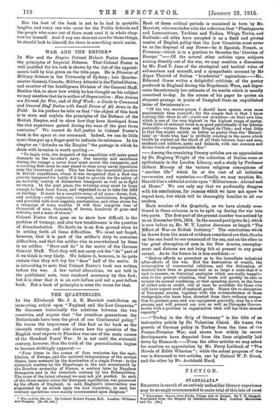THE QUARTERLIES,
In the Edinburgh Mr. J. A. R. Marriott contributes an interesting article upon "England and the Low Countries." He discusses historically the relations between the two countries, and argues that "for countless generations the Netherlands have been the pivot of our Continental policy." He traces the importance of this fact as far back as the eleventh century, and also shows how the question of the English wool exports to Flanders was one of the main causes of the Hundred Years' War. It is not until the sixteenth century, however, that the truth of the generalization begins to become strikingly apparent :— " Four times in the course of four centuries has the equi- librium of Europe, and the national independence of the several States, been menaced by the domination of a single Power in the sixteenth century by the Hapsburgs, in the late seventeenth by the Bourbon monarchy of France, a century later by Napoleon Bonaparte, and in the twentieth century by the Hohenzollern. The issue of the latest attempt we may not yet predict. In each of the three earlier crises the European equilibrium was preserved by the efforts of England; in each England's intervention was stimulated by an attack upon the Low Countries ; in each her military operations were mainly concentrated upon Belgium."
• • War and the gni. sr, By Colonel Hubert. Foster, B.E. London; William and Draw... [Sa, ad. net]
Each of these critical periods is examined in turn by Mr. Marriott, who concludes with the reflection that "Plantageneta and Lancastrians, Yorkiete and Tudors, Whigs, Tories, and Radicals—all alike have accepted it as a fixed and pivotal maxim of English policy that the Low Countries must never be at the disposal of any Power—be it Spanish, French, of Prussian—which is in a position to threaten the ' liberties of Europe.' "—Of the several other articles upon subjects arising directly out of the war, we may mention a discussion by Mr. Fred T. Jane of the strategical and tactical value of submarines and aircraft, and a sympathetic account by Mr Algae Thorold of Italian "Irredentist" aspirations.—Mr.. Edmund Gosse writes a delightful criticism of the poetry produced in England during the Napoleonic Wars, and depre- cates the extremely low estimate of its merits which is usually conceived to-day. In the course of his paper he quotes an eloquent passage in praise of Campbell from an unpublished letter of Swinburne's:— " Of his two master-pieces I should have spoken even more passionately than yourself ; for the simple fact is that I know nothing like them at all—simile ant setundum—in their own line, which is one of the very highest in the highest range of poetry. What little of national verse is as good patriotically is far inferior pootically—witness Burns and Itouget de Flsle ; and what little in that line might satisfy us better as poetry than the ' Marseil- laise ' or Scots wha hoe' is pitifully wanting in the nerve which thrills by contact all the blood of all their hearers, boys and men, students and soldiers, poets and dullards, with one common and divine touch of unquenchable fire."
—Among the remaining literary articles are an appreciation by Dr. Hagberg Wright of the collection of Italian noose or epithalamia in the London Library, and a study by Professor Gilbert Murray of the various religious conceptions of "another life" which lie at the root of all initiation ceremonies and mysteries.—Finally, we may mention Mr. Harold Cox's editorial article upon " Militariemus : Abroad and at Home." We can only say that we profoundly disagree with his conclusions, for reasons which we have not apace to repeat here, but which will be thoroughly familiar to all our readers.
Each number of the Qmplerly, as we have already men- tioned in these columns, is to be split up during the war into two parts. The first part of the present number was noticed by us on December 26th, 1914. In the second part (price 3s.), which is now before us, Mr. W. T. Layton discusses at length "The Effect of War on British Industry." The conclusions which he draws from the mass of evidence considered are that, thanks on the one hand to our command of the sea, and on the other to the great absorption of men in the New Armies, unemploy- ment and distress are not being felt at present to any great extent. As to the future he is less confident:— "History affords no precedent as to the immediate industrial after-effects of the war. But the destruction of wealth, the interruption of commercial relations, and the dislocation of markets have been so general and on so large a scale that it is such to assume, on historical analogies which are really inapplic- able to the present situation, that trade will quickly be able to resume its normal conditions, or that spending power, in the form of either coin or credit, will at once be available for those who will have urgent need of material goods. Hence the re-absorption of European armies, together with the re-transference of those workpeople who have been diverted from their ordinary occupa- tion to produce guns and war equipment generally, may be a slow process, and will present our own as well as European Govern- ments with a problem in organization that will tax their utmost capacity."
—" Turkey in the Grip of Germany" is the title of an instructive article by Sir Valentine Chiral. He traces the growth of German policy in Turkey from the time of the Franco-Prussian War, and shows how widely its recent developments have departed from the lines originally laid down by Bismarck.—From the other articles we may select for mention an appreciation by Mr. Percy Lubbock of "The Novels of Edith Wharton "; while the actual progress of the war is discussed in two articles, one by Colonel W. P. Blood, and the other by Mr. Archibald Hurd.


































 Previous page
Previous page